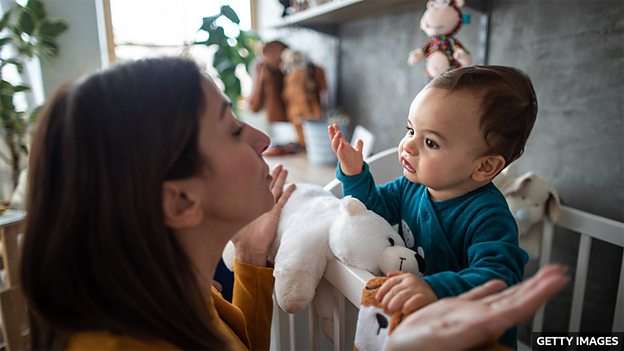小婴儿咿咿呀呀的哭闹声也能反映出不同地区的口音? 不同地方的婴儿的哭声之间有着惊人的差异。在本文中,我们将了解婴儿是如何开始学习语言、影响语言发展的因素有哪些、以及为什么牙牙学语是语言发展的关键状态。
词汇:accents 口音
No! That's the only word we hear in the latest cute baby video to go viral. But it's not the words that baby Orla says that has made this video so popular. It's the fact that her babbling clearly mimics the distinctive Scouse accent from Liverpool.
This now-famous infant may only have been born in 2022, but the different accents of babbling babies have been investigated for many years. A study from 2009 found that French babies tend to cry with a rising intonation, while German babies' cries often have a falling intonation. Other studies have shown American and French babies reflecting syllables from English and French respectively, and that babies with parents who speak a tonal language, like Mandarin, had a greater range of tones in their crying.
So why does this happen? As children develop, they practise making the sounds of the language that they hear around them. It's natural that they pick up the sounds and rhythms that surround them. In fact, babies start to learn language from their mother from three months before birth. However, it's not just the language of immediate family and caregivers that has an impact. Professor of developmental psychology, Caroline Floccia, highlights studies suggesting that children are more likely to acquire the accent of their environment than that of a parent who has an accent that is foreign to that location.
Why is this important to know? Well, what it shows us is that babies are learning language through practice, and that the more time that parents spend interacting with their children, the greater the opportunity for this there is. While babbling babies may not be able to say many words, studies estimate that they can understand many times the number of words than those that they can actually say. Giving babies exposure to a greater number of words, allows them to better build their vocabulary.
词汇表
babbling 婴儿发出的咿呀声
mimic 模仿
distinctive 独特的
Scouse accent 利物浦口音
infant 婴儿
intonation 语调
syllable 音节
tonal 有声调的
tone 声调,语气
sound 声音
pick up 学会
rhythm 韵律,节奏
immediate family 直系亲属
caregiver 看护者
developmental psychology 成长心理学
acquire 学到,获得
foreign 不同的,外来的
interact 互动
exposure 暴露,接触
vocabulary 词汇量
测验与练习
1. 阅读课文并回答问题。
1. Which accent does Baby Orla's babbling sound like?
2. How does the intonation of French and German babies' crying differ?
3. How is the crying of babies whose parents speak a tonal language different?
4. When do babies start to learn language?
5. True or false. Babies always learn the accent of their parents.
2. 选择意思恰当的单词或词组来完成下列句子。
1. People's _______ can have a rising or falling pattern.
exposure vocabulary intonation infant
2. People from Liverpool often have a _______ accent.
babbling tone syllable Scouse
3. The sound of a word is made up of different _______ .
syllables exposure vocabulary babbling
4. Some birds _______ the sounds they hear around them.
exposure tone interact mimic
5. The bassline of a piece of music gives it _______ .
exposure distinctive rhythm intonation
答案
1. 阅读课文并回答问题。
1. Which accent does Baby Orla's babbling sound like?
Baby Orla's babbling sounds like the scouse accent of Liverpool.
2. How does the intonation of French and German babies' crying differ?
French babies often show a rising intonation in their crying, while German babies show a falling intonation.
3. How is the crying of babies whose parents speak a tonal language different?
Babies whose parents speak a tonal language have shown a greater range of tones in their crying.
4. When do babies start to learn language?
Babies start to learn language from their mothers from three months before birth.
5. True or false. Babies always learn the accent of their parents.
False. Babies are unlikely to acquire the accent of a parent who is foreign to that location.
2. 选择意思恰当的单词或词组来完成下列句子。
1. People's intonation can have a rising or falling pattern.
2. People from Liverpool often have a scouse accent.
3. The sound of a word is made up of different syllables.
4. Some birds mimic the sounds they hear around them
5. The bassline of a piece of music gives it rhythm.

